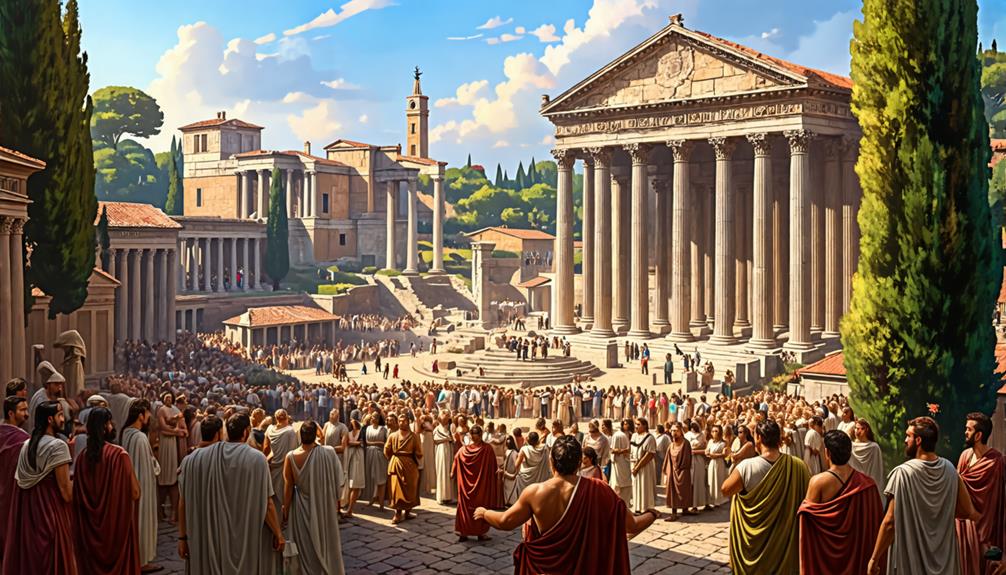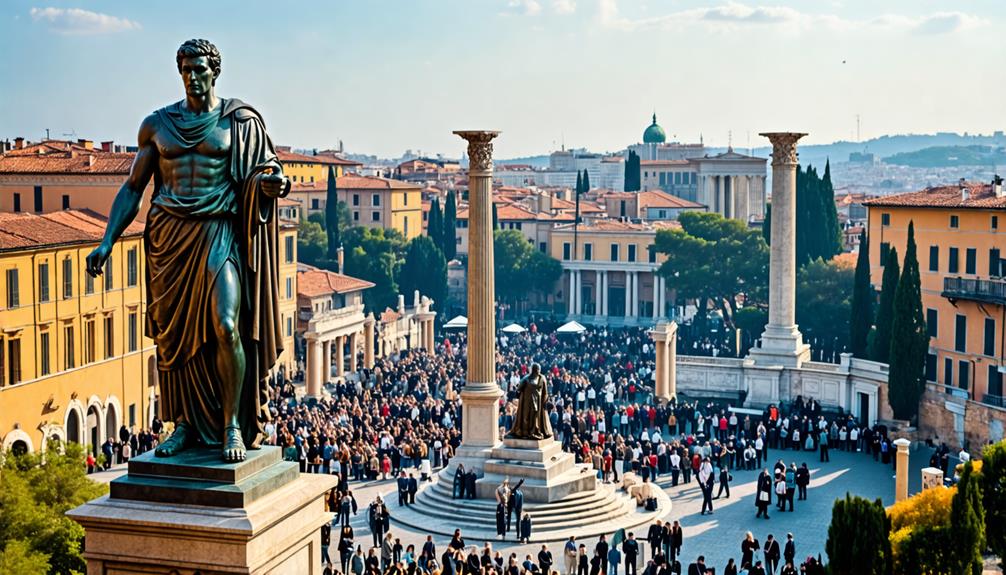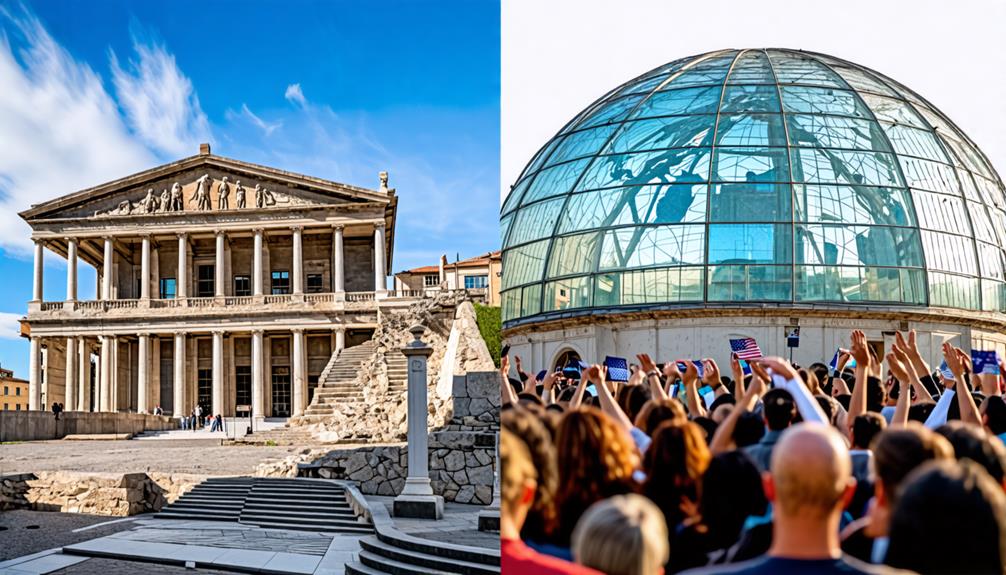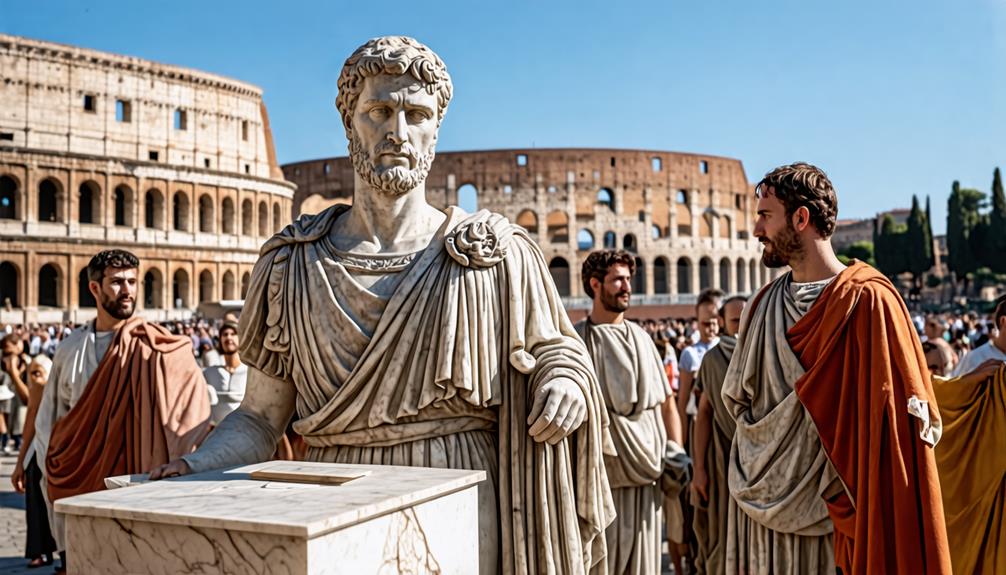Imagine a world where the Roman Republic embraced representative democracy. This inclusive political system would have expanded citizenship rights and shaped the empire's trajectory.
How would this alternate reality have unfolded, and what lessons could we learn from it today? The rise of a more democratic Rome would have had far-reaching consequences, influencing the foundation of modern democracies and altering the course of history.
Origins of Roman Democracy

In an alternate timeline, the Roman monarchy could have persisted beyond 509 BCE, potentially delaying or altering the development of representative institutions. One theory suggests that without the overthrow of the monarchy, the Senate and assemblies mightn't have gained the same level of power and influence. It's possible that a more centralized form of government, with power concentrated in the hands of a single ruler, could have emerged.
While the Roman Republic laid the groundwork for representative democracy, it's unclear how this would have unfolded if the monarchy had remained in place. Some historians speculate that without the checks and balances provided by the Senate and assemblies, the Roman state could have become more autocratic. Others argue that the monarchy might've eventually given way to democratic reforms, albeit at a later date and under different circumstances.
It's worth noting that similar transitions from monarchy to more representative forms of government occurred in other ancient civilizations, such as Athens in the 6th century BCE. Had the Roman monarchy persisted, it's conceivable that a comparable shift could have taken place at a later point in Roman history, perhaps inspired by the example of other societies.
Constitutional Reforms and Institutions
In an alternate history, the Roman Republic may have developed differently, leading to changes in its representative democracy. One theory is that the Centuriate Assembly could have gained more power, potentially overshadowing the role of the Senate in making laws and electing consuls. This shift in power dynamics might've altered the balance between the wealthy and the common citizens.
Another possibility is that the Twelve Tables mightn't have been created, resulting in a less structured legal system. This could have led to more arbitrary rulings and increased inequality among social classes. The absence of the Licinian-Sextian laws might've further exacerbated wealth disparities, potentially leading to greater civil unrest and instability within the Republic.
While the Roman Republic was the first to implement these specific reforms and institutions, similar systems emerged in other civilizations at later dates. For example, the Athenian democracy in ancient Greece also had assemblies and codified laws, although with different structures and roles compared to those of the Roman Republic.
Expansion and Challenges

In an alternate timeline, if the Roman Republic had successfully adapted its representative democracy to govern its expanding empire, it might've led to a more stable and long-lasting Roman state.
One theory suggests that this could have involved granting citizenship rights to people in conquered territories, which would have given them a stake in the Republic's success.
Another possibility is that the Republic might've developed new political institutions, such as regional assemblies or a more powerful Senate, to better manage its vast holdings.
It's worth noting that some historians believe that the Roman Empire under Trajan in the 2nd century AD came close to achieving a similar level of stability and representation, although it ultimately failed to fully address the challenges of governing such a large and diverse territory.
If the Roman Republic had managed to overcome these obstacles, it could have had far-reaching effects on the course of world history, potentially influencing the development of representative government and the spread of Roman culture and ideas.
Cultural and Intellectual Impacts
Had the Roman Republic adapted its representative democracy, it could have significantly influenced Western culture and intellectual traditions.
One theory is that this successful adaptation would have shaped art, literature, and philosophy in profound ways, particularly political thought.
The works of thinkers like Cicero, Polybius, Livy, and Sallust might've gained even greater prominence, with their ideas on mixed constitutions, checks and balances, civic virtue, and moral decline becoming more widely discussed and applied.
It's possible that similar political systems could have emerged centuries later, inspired by the Roman model, but the direct legacy of an adapted Roman Republic would have been immense.
Legacy and Modern Implications

The Roman Republic's representative democracy, had it fully developed, would have significantly influenced modern political systems. One theory suggests that it could have led to a more widespread adoption of democratic principles, potentially reshaping the course of history.
Another possibility is that it might've inspired other civilizations to experiment with similar forms of governance.
Interestingly, some argue that the United States' founding fathers drew inspiration from the Roman Republic when drafting the Constitution. They incorporated elements such as the separation of powers and checks and balances, which can be traced back to Roman political thought.
However, the extent to which the Roman Republic directly influenced the creation of the United States' government remains a topic of debate among historians.
Conclusion
You've ventured through the vicissitudes of Roman history, visualizing an alternate reality where representative rule reigned.
This tantalizing tale of a transformed republic reverberates through the annals of political thought, sowing seeds of speculation.
What world would we witness if Rome had realized this radical vision?
While we can't rewrite the past, pondering the possibilities provides profound insight into the promises and perils of power in the hands of the people.

Leave a Reply